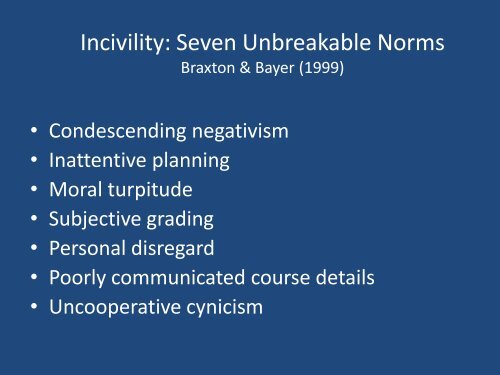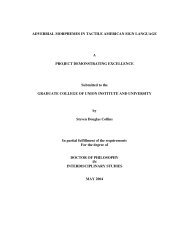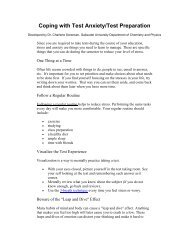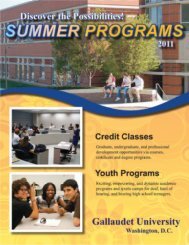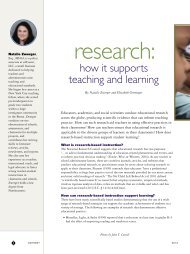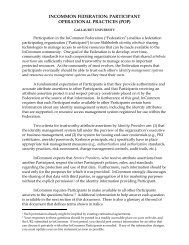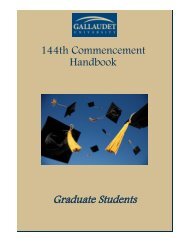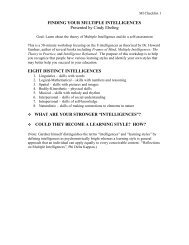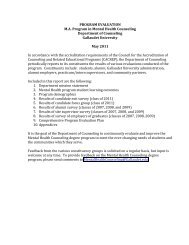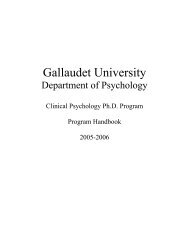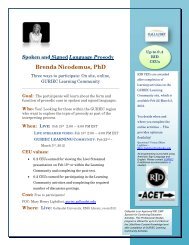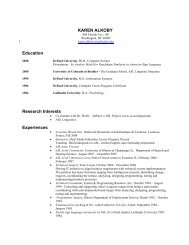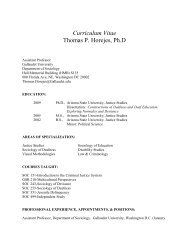Incivility: Seven Unbreakable Norms - Gallaudet University
Incivility: Seven Unbreakable Norms - Gallaudet University
Incivility: Seven Unbreakable Norms - Gallaudet University
You also want an ePaper? Increase the reach of your titles
YUMPU automatically turns print PDFs into web optimized ePapers that Google loves.
<strong>Incivility</strong>: <strong>Seven</strong> <strong>Unbreakable</strong> <strong>Norms</strong><br />
Braxton & Bayer (1999)<br />
• Condescending negativism<br />
• Inattentive planning<br />
• Moral turpitude<br />
• Subjective grading<br />
• Personal disregard<br />
• Poorly communicated course details<br />
• Uncooperative cynicism
• Repudiation of grades<br />
• Critique of work<br />
• Narcissism<br />
• Consumerism<br />
• Consumer orientation-<br />
Causes for <strong>Incivility</strong><br />
– pay for right and to pass course; culture of entitlement<br />
of current traditional college cohort<br />
Nordstrom, C. Bartels, L.K., Bacy, J College Student Journal. March 2009, Vol 43, Iss 1, pg 74
Perceptions of entitlement have come under<br />
scrutiny in a number of ways. Students believe that<br />
knowledge should require little effort on their part.<br />
In addition, students want to be entertained today.<br />
Lastly, many feel they should be rewarded for<br />
coming to class.<br />
Nordstrom, C. Bartels, L.K., Bacy, J College Student Journal. March 2009, Vol 43, Iss 1, pg 74.
Evidence suggests incivility is a<br />
growing concern on campuses.<br />
(Clark, C. & Springer, P., 2007)<br />
Journal of Nursing Education
Study-2005<br />
<strong>Incivility</strong>: Problematic Behavior<br />
Cheating on tests<br />
Plagiarism<br />
Sarcastic remarks<br />
Talking<br />
Sleeping in class<br />
Use of computer not related<br />
to class<br />
Demanding make-up exams,<br />
extensions, etc<br />
Inappropriate sounds or<br />
gestures<br />
Dominating class<br />
discussions<br />
Asking to hold onto<br />
student’s personal property<br />
Refusing to answer direct<br />
questions<br />
Not paying attention<br />
Arrive to class/clinical late<br />
Leave early<br />
Acting bored or apathetic<br />
Cutting class<br />
Unprepared for class<br />
Verbal abuse<br />
Physical abuse<br />
3 nurse educators killed in 2002<br />
by nursing student at <strong>University</strong><br />
of Arizona
Report<br />
Documented<br />
Supervisor<br />
may deal<br />
or aid<br />
Transfers<br />
ownership<br />
of problem<br />
Alleviates legal<br />
liabilities<br />
Problematic Behavior<br />
Not Report<br />
Avoid hassle<br />
documenting<br />
Tenure<br />
Afraid of<br />
student<br />
Lack<br />
of administrative<br />
support<br />
Confront Not Confront<br />
Call attention<br />
to behavior<br />
Opportunity<br />
to interact<br />
for positive<br />
outcome<br />
Retain respect<br />
of other<br />
students<br />
Behavior<br />
continues<br />
Other students<br />
lose respect<br />
for faculty<br />
You claim<br />
responsibility<br />
Legal reprise<br />
Lose credibility<br />
at clinical
“Academic incivility is a significant problem and reports of discord<br />
on college campuses underscore the need for addressing uncivil<br />
behaviors in a forthright manner.”<br />
(Clark, C. 2008. )<br />
Journal of Nursing Education, Oct 2008
Standards of Practice<br />
• Holding students to the standards difficult<br />
– Feeling of entitlement exists<br />
• Published criteria needed<br />
• Consistency among faculty<br />
• Preparedness by faculty<br />
– Verbal and non-verbal
Did you know?<br />
“When students do not<br />
like a teacher it is most<br />
likely because of the<br />
teachers attitude.”<br />
(Tang, Chou, Chiang, 2005)
Questions?<br />
Janet Tompkins McMahon RN, MSN<br />
Clinical Associate Professor of Nursing<br />
Nursing Education Consultant<br />
Towson <strong>University</strong><br />
Hagerstown, Maryland<br />
jtmcmahon@towson.edu<br />
janetmcmahon2@gmail.com<br />
Cell-570-419-4059
Additional references<br />
Donner, G.J., & Wheeler, M.M.(Feb 2007). Mentoring as a leadership development<br />
strategy. The Canadian Nurse. (103)2.<br />
Gatzke, H., & Ransom, J.E.(July-September, 2001). New skills for a new age: Preparing<br />
nurses for the 21st century. Nursing Forum (36)3.<br />
Gilroy, M. (2008). Colleges grappling with incivility. The Education Digest. 74(4) 36-41.<br />
Kerfoot, K.(January-February 2005). Signature strengths: Achieving your destiny.<br />
Nursing Economics. (23)1.<br />
Kolando, K. M., Clark, C., Heinrich, K. T. & Olive, D. (2006). Academic dishonesty,<br />
bullying, incivility, and violence: Difficult Challenges facing nurse educators.<br />
Nursing education Perspectives. York 27 (1) 34-44.<br />
Nordstrom, C. R., Bartels, L. K. & Bucy, J. (2009). College Student Journal. Southern<br />
Illinois <strong>University</strong>. 43 ( 1) 74-86.<br />
Pricer, W. F. (2008). At issue: classroom management and safety, an annotated bibliography.<br />
The Community College Enterprise. 14 (1) 31-48.<br />
Riddell, T.(March 2007). Critical assumptions: Thinking critically about critical<br />
thinking.<br />
Journal of Nursing Education. (46)3.<br />
Scanlan, J.M., & Care, W.D.(October 2004). Grade inflation: Should we be concerned?<br />
Journal of Nursing Education. (43)10.


